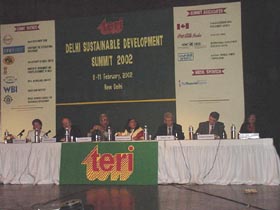10 February 2002: Plenary session 4
Managing natural
resources for society: welfare and health implications
|
|
| Chairperson |
|
Prof. Y K Alagh
Former Union Minister and Member of Parliament, India
"In India, there is a lot of
pressure on land. India will have to manage land in the South-Asian way." |
|
| |
| Speaker |
|
Dr Maria Ligia Noronha
Senior Fellow, TERI
"We can build coalition only if there is mutual trust
amongst stakeholders."
|
|
|
|
| Speaker |
|
Mrs Meenakshi Datta Ghosh
Joint Secretary, Ministry of Health and Family Welfare,
Government of India
"We need to adopt an out-of-the-box approach
of thinking."
|
|
| |
| Speaker |
Mr
Robert Lion
Member of the Board of Directors of the French High
Council for International Co-operation and President - Energy 21, France
"Most important is the survival rate of small
enterprises"
|
|
| |
| Speaker |
|
Prof. Charles Perrings
Head of Department – Environment, University of
York
"Local market failures lead to
under-investment in conservation efforts"
|
|
|
|
| Speaker |
|
Mr David Runnalls
President, International Institute for Sustainable
Development, Canada
"Like the chemical industry 20 years
ago, the mining industry too is in grave danger because of its malpractices."
|
|
| |
| Speaker |
|
Dr Yasmin von Schirnding
Focal Point: Agenda 21, World Health Organization,
Switzerland
"Causes and effects are difficult to disentangle"
|
|
| |
| Session summary |

Natural resource management has significant
implications for social welfare. Governments are moving away from providing economic
services to formulating institutional frameworks for economic and social sectors. Such
decentralization, in partnership with civil society and corporates, is the key to success.
Preferred resource management is gender-sensitive; recognizes cultural and biological
diversity; invests partial resource income in community development; and ensures
transparency and adequacy of compensation payments. Addressing demographic issues of
resource scarcity and use requires an integrated policy - demand-driven, need-based,
area-specific, people-centred, and cross-sectoral.
Policy, regulatory, and fiscal barriers to the wider availability of health services
should be dismantled and budgets for social franchising of health care services/products
must be supplemented. Health issues are high on the development and political agenda
because of their implications and should be addressed through supportive structures, new
institutional behaviours, and additional resources, which promote socio-economic well
being. Since local health issues are dependent on global consensus, greater cooperation
between countries is desirable.
Replicating/strengthening successful local institutions is important as sustainable
micro-enterprises catalyse self-sufficiency of marginalized communities. Sector-specific
assessments (like the minerals and mining sector) can help business move towards
operationalizing sustainable development.
Governments should clearly delineate resource rights, establish rent-sharing rules, assign
responsibilities for social provisions, and enhance transparency and information flow.
Civil society must demand information from governments and protest if development is not
in public interest. Private sector should go beyond shareholder value to stakeholder
value. Addressing sustainability issues is about strategic risk management as well as
ethics.
|
|
|